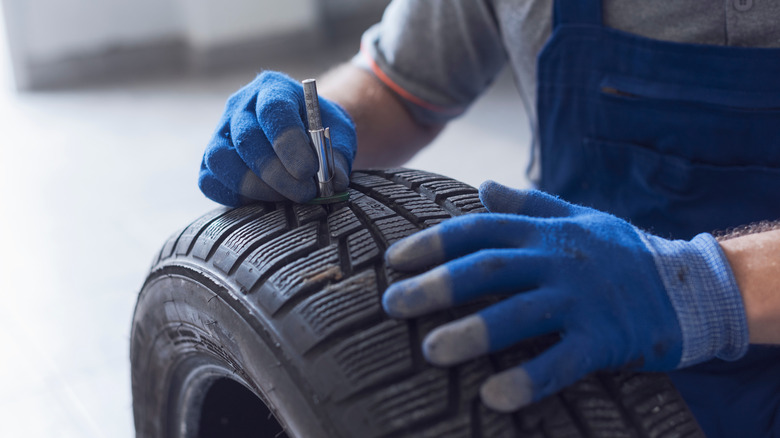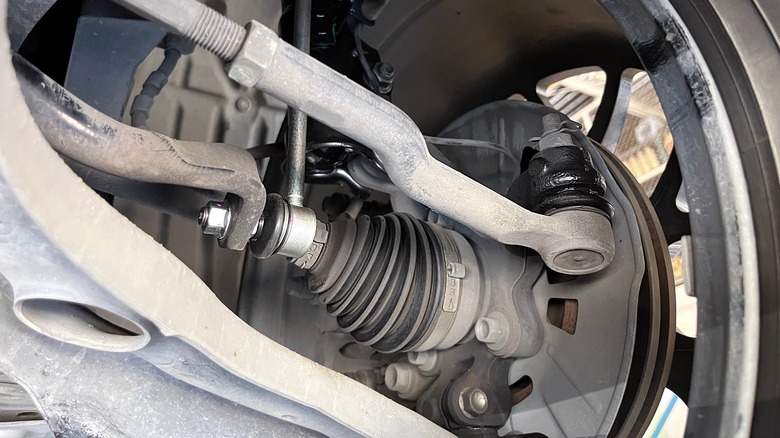Here's What It Means If Your Tires Make A Thudding Noise
The last thing vehicle owners want to hear while on the road are any kind of unwanted noises coming from their car, truck, or SUV, which is why when people start to notice a thudding sound emanating from their tires, they can bet that the unwanted ruckus flooding their ears is more than just an annoyance. It should be viewed as a warning sign that something is wrong, and just getting used to the unpleasant bumps is not a wise option. The best bet for people going through this dilemma, no matter what make or model is experiencing the problem, is to take immediate action to ensure the next outing is a much smoother ride.
Identifying the root of the tire-related thuds isn't as easy as it sounds. Just because it's known where it's coming from does not necessarily indicate what is making it happen. The distinctive clamor from the tires could very well be a strong indication of various issues, ranging from minor inconveniences to serious hazards that will only lead to more problems down the road. While each potential cause carries its own set of implications and required actions, figuring out the source of a thudding noise can vary, so vehicle owners must recognize and respond to these auditory cues.
Whether the culprit turns out to be the tie rod, suspension system, or one of the wheels, understanding the significance of these tire-related thumping sounds is much more than just practicing responsible habits regarding automotive maintenance. It's really about maintaining the longevity of a person's primary mode of transportation and, more importantly, keeping everyone in the vehicle safe at all times.
When tires are to blame
A thudding noise while driving is, more often than not, a telltale sign of an issue directly related to the tires. One common reason is tire imbalance, where the weight distribution around the tire is uneven, leading to erratic rotation and a noticeable thud with each turn of the wheel. Another potential issue could be uneven tire wear, which often results from improper alignment or inconsistent tire rotation schedules, which not only produces a thudding sound but also affects the vehicle's handling and fuel efficiency.
There is also a chance that underinflated or overinflated tires or incorrect tire pressure could very well be the main contributors to this problem, which is why proper inflation and regularly checking the tire pressure not only ensures a smooth and safe ride but also extends the lifespan of your tires.
The clamorous catalyst could be from bulges, blisters, or deep cuts, commonly known defects known for compromising the tire's structure, causing irregular movements and sound-emitting vibrations. Debris or foreign objects entrenched in the tires, such as nails or stones, could very well be causing the calamity, as they tend to create an uneven surface on the tire tread. Another concern that may end up being the source of the commotion could be internal damage, such as broken belts or issues with the wheel's internal structure.
Whatever the cause might be, making every effort to ensure these tire-related dilemmas are promptly rectified is crucial not only for eliminating the noise but also for ensuring the vehicle's safety and optimal performance. It's also recommended that consumers replace their tires every six years. But while they are often the culprit, the wheels, surprisingly, aren't the only suspects in this case.
Other causes of thudding noises in tires
When people hear a thudding noise from the tires while driving, it can sometimes be attributed to problems with the tie rod, which enables the wheels to turn by transmitting the force applied from the steering center link or the rack gear to the steering knuckle. A problem with this imperative component can manifest as a thumping or knocking sound, which becomes particularly noticeable when turning the vehicle. Tie rods can become worn due to regular use, or they can easily suffer damage from exposure to road hazards such as potholes or hitting curbs.
Constantly putting the pivotal part's toughness to the test can lead to looseness in the tie rod joints, resulting in drivers being unable to avoid the unwanted sound due to excessive movement. With all this information in mind, it's very evident that identifying and addressing tie rod issues is critical, as they play a vital role in the vehicle's overall safety. But they aren't the only ones suspected of making the tire-related thuds.
It's no secret the suspension system plays a vital role in tire stability and vehicle comfort. Issues like worn or damaged shock absorbers and struts can lead to uneven contact with the road and cause abrupt noises, especially when driving over uneven surfaces or bumps. Problems with suspension bushings can contribute to this issue if they harden or crack, inviting a symphony of metal-on-metal contact to make its presence known during turns or on bumpy roads. Regular inspections and proper suspension system maintenance are essential to prevent these ordeals, ensuring a smooth, safe, and noise-free driving experience.


